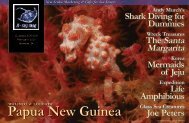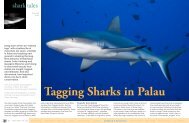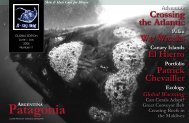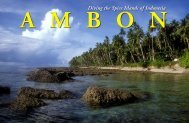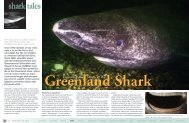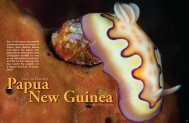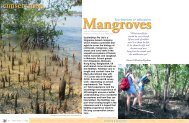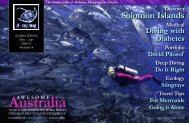Medium resolution version of X-Ray Magazine (96 dpi)
Medium resolution version of X-Ray Magazine (96 dpi)
Medium resolution version of X-Ray Magazine (96 dpi)
Create successful ePaper yourself
Turn your PDF publications into a flip-book with our unique Google optimized e-Paper software.
fact file<br />
Indonesia<br />
RIGHT: Location <strong>of</strong> Sulawesi<br />
Island on global map.<br />
BELOW: Location <strong>of</strong><br />
Sulawesi Island on<br />
map <strong>of</strong> Indonesia<br />
sources: cia.gov world factbook,<br />
starfish.ch<br />
History In the early 17th century,<br />
the Dutch began to colonize<br />
Indonesia. From 1942 to 1945,<br />
Japan occupied the islands.<br />
After Japan’s surrender in WWII,<br />
Indonesia declared its independence,<br />
however, it took four years<br />
<strong>of</strong> negotiations, recurring hostilities<br />
and mediation by the United<br />
Nations for the Netherlands to<br />
finally agree to transfer sovereignty<br />
in 1949. 1999 marked the year<br />
<strong>of</strong> Indonesia’s first free parliamentary<br />
election after decades <strong>of</strong><br />
repressive rule. The world’s thirdlargest<br />
democracy, Indonesia is<br />
the world’s largest archipelagic<br />
state. It is also home to the world’s<br />
largest Muslim population. Current<br />
challanges include: improveing<br />
education, alleviating poverty,<br />
curbing terrorism, initiating economic<br />
and financial reforms,<br />
controling corruption, holding the<br />
military and police accountable<br />
for human rights violations in the<br />
past, addressing global warming,<br />
and controlling bird flu. An<br />
historic peace agreement with<br />
armed separatists in Aceh was<br />
reached in 2005, which led to<br />
democratic elections in Aceh<br />
in 2006. However, the government<br />
still faces sporadic armed<br />
resistance by the separatist Free<br />
Papua Movement. Government:<br />
republic. Capital: Jakarta<br />
Geography Indonesia is an<br />
archipelago <strong>of</strong> islands located<br />
in Southeastern Asia, between<br />
Andaman<br />
Sea<br />
the Indian Ocean and<br />
the Pacific Ocean.<br />
Coastline: 54,716 km.<br />
The terrain is mostly<br />
coastal lowlands with<br />
interior mountains<br />
on the larger islands.<br />
Lowest point: Indian<br />
Ocean 0m. Highest<br />
point: Puncak Jaya<br />
5,030m. Note: Indonisea<br />
is made up <strong>of</strong> 17,508<br />
islands <strong>of</strong> which 6,000<br />
are inhabited. It straddles<br />
the equator in a<br />
strategic location adjacent<br />
to major sea lanes<br />
from Indian Ocean to<br />
Pacific Ocean. Piracy and armed<br />
robbery has been known to occur<br />
against ships in the territorial and<br />
<strong>of</strong>fshore waters in the Strait <strong>of</strong><br />
Malacca and South China Sea.<br />
Climate Indonesia has a<br />
tropical, hot, humid climate with<br />
more moderate temperatures in<br />
the highlands. Natural hazards<br />
include severe droughts, occasional<br />
floods, earthquakes, tsunamis,<br />
volcanic activity and forest<br />
fires.<br />
Environment Deforestation;<br />
water pollution from industrial<br />
wastes, sewage; air pollution in<br />
urban areas; smoke and haze<br />
from forest fires. Indonesia is<br />
party to agreements including:<br />
Biodiversity, Climate Change,<br />
Climate Change-Kyoto Protocol,<br />
Medan<br />
THAILAND<br />
Pekanbaru<br />
INDIAN<br />
OCEAN<br />
Gulf <strong>of</strong><br />
Thailand<br />
MALAYSIA<br />
VIETNAM<br />
South<br />
China Sea<br />
SINGAPORE<br />
BRUNEI<br />
MALAYSIA<br />
BORNEO<br />
Pontianak<br />
Padang<br />
Kalimantan<br />
Sulawesi<br />
Sumatra<br />
Banjarmasin<br />
Palembang<br />
Ciwandan<br />
Java Sea<br />
JAKARTA<br />
Semarang<br />
Makassar<br />
Bandung<br />
Java Surabaya<br />
Banda Sea<br />
Desertification, Endangered<br />
Species, Hazardous Wastes,<br />
Law <strong>of</strong> the Sea, Ozone Layer<br />
Protection, Ship Pollution, Tropical<br />
Timber 83, Tropical Timber 94,<br />
Wetlands. The country has signed,<br />
but not ratified Marine Life<br />
Conservation.<br />
Denpasar<br />
PHILIPPINES<br />
Celebes<br />
Sea<br />
Kupang<br />
Philippine<br />
Sea<br />
Ambon<br />
TIMOR-LESTE<br />
Timor<br />
Sea<br />
Economy As a vast polyglot<br />
nation, Indonesia has been able<br />
to weather the global financial<br />
crisis relatively smoothly due to<br />
its heavy reliance on domestic<br />
consumption as the impetus<br />
for economic growth. To counter<br />
the effects <strong>of</strong> the crisis, the<br />
government used fiscal stimulus<br />
measures and monetary policy<br />
and <strong>of</strong>fered cash transfers to<br />
poor families. Consumption was<br />
partially buoyed by campaign<br />
spending in advance <strong>of</strong> legislative<br />
and presidential elections in<br />
2010. Economic advances and<br />
significant reforms in the financial<br />
sector, including tax and customs<br />
reforms, the use <strong>of</strong> Treasury bills,<br />
and capital market development<br />
and supervision, were made<br />
under President Yudhoyono.<br />
Increasingly robust GDP growth<br />
and sound fiscal stewardship<br />
has steadily reduced Indonesia’s<br />
debt-to-GDP ratio in recent years.<br />
Pursistent challenges include poverty<br />
and unemployment, inadequate<br />
infrastructure, corruption,<br />
a complex regulatory environment,<br />
and unequal resource distribution<br />
among regions. Natural<br />
resources: petroleum, tin, natural<br />
gas, nickel, timber, bauxite, copper,<br />
fertile soils, coal, gold, silver.<br />
Agriculture: rice, cassava, peanuts,<br />
rubber, cocoa, c<strong>of</strong>fee, palm<br />
NORTH<br />
PACIFIC<br />
OCEAN<br />
Equator<br />
Aratura<br />
Sea<br />
Biak<br />
New Guinea<br />
PAPUA NEW<br />
GUINEA<br />
AUSTRALIA<br />
oil, copra; poultry, beef, pork,<br />
eggs. Industries: petroleum and<br />
natural gas, textiles, apparel, footwear,<br />
mining, cement, chemical<br />
fertilizers, plywood, rubber, food,<br />
tourism.<br />
Currency Indonesian Rupiah<br />
(IDR). Exchange rates: 1EUR =<br />
11,715.31 IDR; 1USD = 8,980.00 IDR;<br />
1GBP = 14,032.15 IDR<br />
Population 240,271,522 (July<br />
2010 est.) Ethnic groups: Javanese<br />
40.6%, Sundanese 15%, Madurese<br />
3.3%, Minangkabau 2.7%, Betawi<br />
2.4%, Bugis 2.4%, Banten 2%,<br />
Banjar 1.7%, other groups 29.9%.<br />
Religions: Muslim 86.1%, Protestant<br />
5.7%, Roman Catholic 3%, Hindu<br />
1.8%, other religions 3.4% (2000<br />
census). Living with AIDS/HIV:<br />
270,000 (2007 est.) Below poverty<br />
line:<br />
17.8%<br />
(2006).<br />
Internet<br />
users: 30 million<br />
(2008)<br />
Language Bahasa Indonesia<br />
(which is the <strong>of</strong>ficial, modified<br />
form <strong>of</strong> Malay), English, Dutch,<br />
local dialects (Javanese is the the<br />
most widely spoken)<br />
Health There is a high degree<br />
<strong>of</strong> risk for food or waterborne diseases<br />
such as bacterial diarrhea,<br />
hepatitis A and E, and typhoid<br />
fever, as well as vectorborne<br />
diseases such as chikungunya,<br />
dengue fever and malaria.<br />
Note: There have been cases in<br />
Indonesia <strong>of</strong> the highly pathogenic<br />
H5N1 avian influenza. However,<br />
it poses a negligible risk to visitors.<br />
Hyperbaric Chambers<br />
Manado (Sulawesi): Malalayang<br />
Hospital, tel: 0812-4302970; and<br />
Pr<strong>of</strong>essor Dr Kan-dou Hospital, tel:<br />
(+62) 8134-0000840<br />
Makassar (Sulawesi): Rumah Sakit<br />
Umum Wahidin Sudirohusodo<br />
Tel: (+62) 0411-584677<br />
Websites<br />
Tourism Indonesia<br />
www.indonesia.travel<br />
North Sulawesi Promotion Board<br />
www.north-sulawesi.org ■<br />
55 X-RAY MAG : 38 : 2010 EDITORIAL FEATURES TRAVEL NEWS EQUIPMENT BOOKS SCIENCE & ECOLOGY EDUCATION PROFILES PORTFOLIO CLASSIFIED



